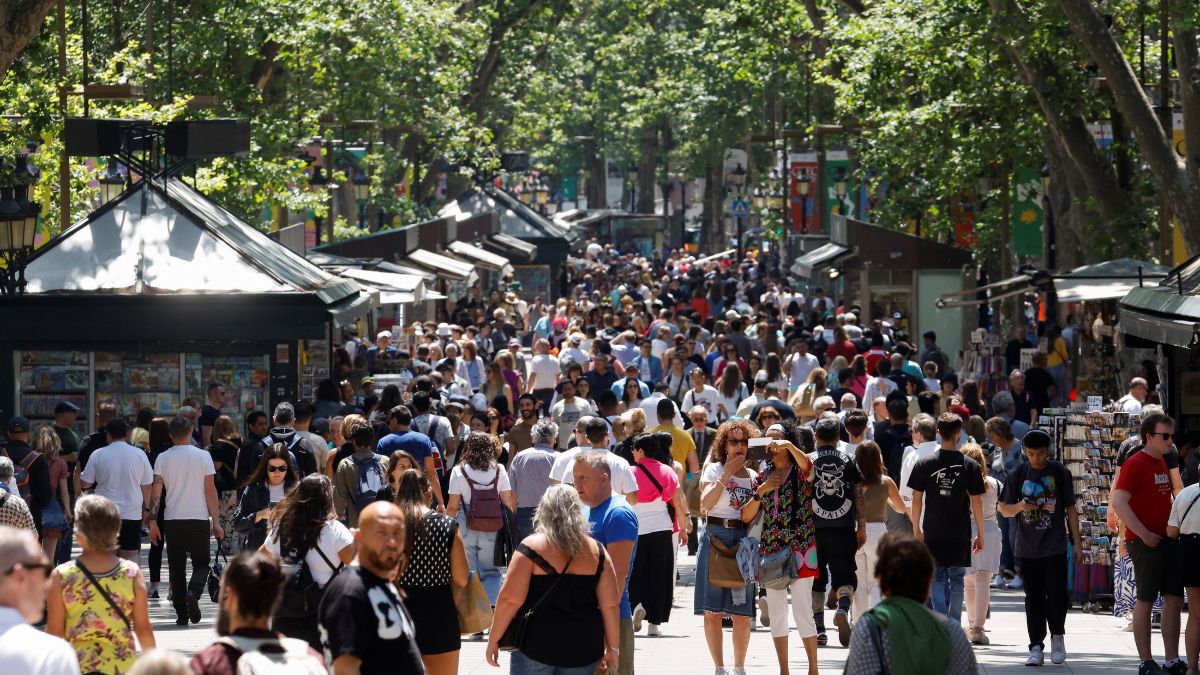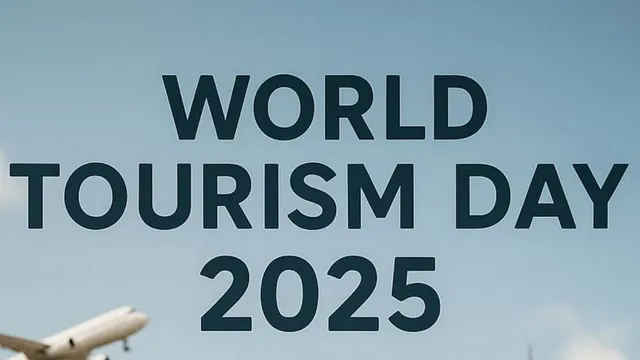- By Raghav Gupta
- Sat, 27 Sep 2025 05:09 PM (IST)
- Source:JND
World Tourism Day 2025: In 1979, the UN Tourism General Assembly decided to establish World Tourism Day and started its observance in 1980. This day aims to commemorate the adoption of the UN Tourism Statutes on 27 September 1970, which serves as an important milestone in the world of tourism.
What is World Tourism Day?
This day serves as a global observance day by the United Nations World Tourism Organisation (UNWTO) to emphasise the social, cultural, political and economic value of tourism. This day aims to help generate economic stability and peace across the world through international development and cooperation. Tourism is much more than an economic sector; rather, it serves as a stimulus for social progress through delivering education, employment and creating new opportunities for all citizens. It also holds the potential to foster peace through empowerment, regeneration and sustainable transformation of our world.
World Tourism Day 2025 Theme
This year’s theme is “Tourism and Sustainable Transformation”, which highlights tourism’s potential for positive change and sustainable transformation. This year highlights the importance of sustainable transformation through tourism in various sectors, including the economy, education, infrastructure, environment, and communities. The elements necessary to bring growth and positive change in these sectors include good governance, strategic planning and robust monitoring, along with clear priority setting that aligns with long-term sustainability goals. To implement these elements, it is essential to prioritise sustainability, resilience, and social equity at the core of tourism development and decision-making.
What is Sustainable Tourism?
The development and progress of civilisation always come with both positive and negative factors that affect various sectors. Sustainable tourism refers to sustainable practices that take a holistic and all-round approach towards minimising the negative effects of the tourism industry on the environment and society while maximising the positive effects.
Positive Impact of Tourism
Tourism has been a helpful tool for the prosperity and development of many countries. Some of its primary benefits include economic growth, infrastructure development, cultural exchange and understanding.
Economic Growth – is the most well-known benefit of tourism as it generates massive revenue and even serves as a major industry for various countries around the world. Such revenue is generated through visitors' spending on accommodations, transportation, food, souvenirs, and other services, which contribute to the growth of the local economy. This money also circulates within the local economy ,which brings benefits to various sectors like hospitality, transportation, agriculture and retail. Tourism also directly or indirectly creates employment opportunities across various sectors related to tourism, such as hospitality, transportation, travel services, attractions, retail, food and beverages, and tourism services. This also helps provide opportunities in diverse skill development and training in areas such as hospitality management, language proficiency, customer service, and cultural preservation, which enhances employability and improves livelihoods.

Infrastructure Development – is connected to the expansion of the tourism sector and leads to the construction of roads, airports and railroads, which efficiently utilise the workforce. Development of tourism also attracts investments in infrastructure projects such as roads, accommodations, airports, recreational amenities and sanitation facilities, which help improve connectivity and accessibility in rural and remote areas. This helps improve the quality of life for local residents who benefit from better access to services and employment opportunities, which reduces rural-to-urban migration.
Cultural Exchange and Understanding – Tourism plays an important role in developing cross-cultural dialogue and the preservation of traditions. Tourism helps nurture cultural exchange and mutual understanding between visitors and host communities, which promotes diversity, tolerance and intercultural appreciation. It also helps in cultural preservation by providing incentives for preservation. Many places around the world have also been able to revitalise and preserve traditional practices, festivals, rituals, performing arts, cultural heritage sites, archaeological sites, monuments, and historic landmarks, which would be passed down to future generations.
Negative Impact of Tourism
Much like any means of progress, overtourism also has negative impacts on the economy, environment and culture.
Economic dependency is a negative effect where communities and even countries become too dependent on tourism, which makes their primary revenue stream tied to tourists. The flow of tourists can have a major impact on the economic stability and prosperity of such communities and countries. The large revenue can also make people invest too much in the tourist sector, which would not only make the market too competitive but also waste money and resources on failed projects.

(Image Credits: Reuters)
Environmental Damage – includes pollution and depletion of natural resources, which not only harms nature but also despoils the natural attractions of the venue. Pollution has the largest effect through air, land and water pollution. Vehicles such as cars, aircraft and ships generate atmospheric pollution through emissions from burning fuels. Land and water pollution occurs through discarding waste materials such as single-use plastics, chemical discharges from facilities and noise pollution from vehicles and large crowds. The tourism industry also consumes a lot of resources, as many areas get overcrowded despite lacking the space and resources to support the lifestyle of such a large number of people. This pressure is especially heavy on local resources such as energy, food, water and other raw materials.
Cultural Damage on Local Communities – occurs due to overtourism, which can not only cause wear and tear on infrastructure and cultural sites but also generate local resentment. Wear and tear can easily be seen on cultural sites like monuments, which occurs due to excessive foot traffic. The damage can also be seen on roads, trails and public facilities that are constantly used, which can lead to rapid deterioration without routine maintenance. Tourism might bring many economic opportunities; however, it can also damage the local community by leaving them out of the profits through these developments. Improving infrastructure can increase the cost of living in the area, which will make it difficult to find affordable housing, hence displacing original residents. Improvement in revenue can also have locals left out, as most revenue-generating opportunities get monopolised by select few individuals and large corporations, which leaves locals stuck with low-wage jobs.

